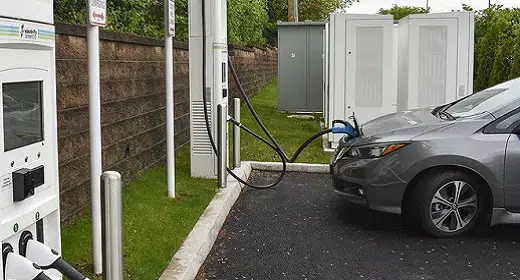by Andrew J. Hawkins: The first tranche of a $7.5 billion pool for states to build more chargers…
The Biden administration announced a five-year $5 billion plan to shore up the nation’s patchy electric vehicle charging network, tapping into funds that were approved as part of the bipartisan infrastructure law signed last year.
The funds represent a broader effort by President Biden’s administration to reduce carbon emissions and fight human-caused climate change. Despite a rise in EV sales over the last few years, at least 25 percent of all carbon emissions come from the transportation sector, most of which is represented by tailpipe emissions.
Congress approved $7.5 billion for EV charging infrastructure as part of the bipartisan infrastructure law, $5 billion of which will be available to states to create a “network of EV charging stations along designated Alternative Fuel Corridors, particularly along the Interstate Highway System,” the administration said. Alternative Fuel Corridors, as defined by the Federal Highway Administration, include approximately 165,722 miles of the National Highway System, covering 49 states and the District of Columbia.
Under the plan, called the National Electric Vehicle Infrastructure Formula Program, states must submit their requests to the Joint Office of Energy and Transportation by August 1st. The Federal Highway Administration will approve eligible plans by September 30th, with $615 million being made available in fiscal year 2022.
A second competitive grant program “designed to further increase EV charging access in locations throughout the country, including rural and underserved communities,” will be announced later this year, the administration said.
“It’s going to help ensure that America leads the world on electric vehicles,” the president said during a speech earlier this week to promote American companies expanding EV infrastructure in the US. “China has been leading the race up to now, but this is about to change,” Biden said. “Because America is building convenient, reliable, equitable national public charging networks. So wherever you live, charging an electric vehicle will be quick and easy.”
There are approximately 41,000 public charging stations in the United States, with more than 100,000 outlets. But finding one that actually works or isn’t locked inside a gated parking garage can be a bit of a scavenger hunt.
The charging experience in the US is intensely fragmented, especially for people who don’t own a Tesla. While Tesla’s Supercharger network has been praised for its seamless user experience and fast charging ability, the opposite appears to be true for pretty much everyone else.
Experts in urban policy and electrification have said that the money authorized for a nationwide network of EV chargers would have a measurable impact on Americans’ car-buying choices. A more dependable charging network will likely help juice EV sales in the US over the next decade.
That said, the types of chargers being built are likely to raise questions about the administration’s desire to get Americans to quickly switch to EVs. Not only will it simply take a while to build out that many chargers, but the majority of what gets built will likely be of the “Level 2” variety, which can replenish about 25 miles of battery capacity per hour. That means EV buyers in the US will have to get used to the idea of sipping electrons while they’re out and about and doing most of their charging at home.
The infrastructure law does allow for funding to go to new DC Fast charging stations. (Same with hydrogen fueling stations.) But Level 2 chargers are far cheaper to build and install, meaning the administration can get more of them for less money. Level 2 chargers only cost a few thousand dollars to get in the ground, while 150kW-350kW faster chargers can be 50 to 100 times as expensive.
Biden also signed an executive order recently to swap the federal government’s fleet vehicles with American-made EVs. The second piece of his plan to spur the mass adoption of electric vehicles is to offer generous tax incentives, which is currently stalled as part of the Build Back Better plan.
Dell’s new XPS 13 Plus launched, with a starting price of $1,199. It looks similar to the previous XPS 13 on the outside — but open it up, and you’ll find a new haptic touchpad, a depressed keyboard, and a “capacitive touch function row” that is, according to Dell, totally not a touch bar.
















































